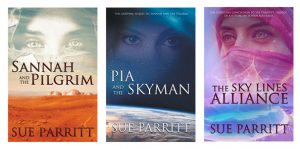Your trilogy, which begins with Sannah and the Pilgrim, is quite racially charged. What inspired you to delve into the complicated issues of racism?

I was, and remain appalled by past and present governments’ policies on refugees and asylum seekers; in recent years particularly the inhumane treatment of those on Nauru and Manus Island.
There’s quite a lot of political activism in your novels. What role do you think activism plays in creating change?
Activism can change societies in radical ways – witness the Civil Rights movement in the USA, the ending of apartheid in South Africa, and looking back to the nineteenth century, the abolition of slavery. Since the age of sixteen when I became a member of the Religious Society of Friends (Quakers) – a faith group that has been concerned with peace, social justice and equality for all people since the 1650s – I have taken part in many protests, written letters to politicians regarding contemporary issues that concern me, and used my experience in public speaking to deliver speeches on subjects such as: ‘Educating for peace, the role of the parent’ during the International Year of Peace. The publication of my three books: Sannah and the Pilgrim, Pia and the Skyman and The Sky Lines Alliance has enabled me to extend my activism – giving talks to a variety of groups such as Probus, U3A and Social Justice groups – on what inspired me to write the trilogy.
With a dystopian future, apartheid and power politics, there’s a lot going on. Did you see the mother-daughter relationship between Sannah and Pia as a grounding element for readers?
I definitely saw the mother-daughter relationship as a grounding element for readers. It is also a constant reminder that ‘ordinary’ individuals can be catalysts for immense change. Sannah and Pia refuse to be defeated by the oppressive regime that controls their lives and are willing to risk imprisonment and even death in order to alter the situation.
You’re originally from England; what appealed to you about setting the trilogy in futuristic Australia and New Zealand, rather than England?
I have lived in Australia since the age of twenty – forty-six years – so this part of the world was the logical choice for the trilogy’s setting. Likewise, I chose south-east Queensland as the setting for Sannah and the Pilgrim, and for much of the action in the subsequent books, as I lived in Brisbane for twenty-nine years prior to relocating to Victoria. I also have deep concerns about the direction my adopted country is heading. From a country that welcomed scores of displaced people after the Second World War, we are becoming xenophobic, rejecting those that have fled what for most of us are inconceivable terrors.
You’ve made New Zealand the egalitarian safe-haven of these books. What is it you love most about the country?
What I love most about New Zealand – apart from the magnificent scenery and friendly people – is that the country’s politicians are not afraid to stand up for what they believe in: e.g. since 1984 nuclear-powered or nuclear-armed ships have been barred from using New Zealand ports or entering New Zealand waters. More recently, on 31 October 2016, Prime Minister John Key said his government would not accept any move to create “different classes of New Zealand citizens” by barring refugees who settled there from ever returning to Australia as proposed by Australian Prime Minister Malcolm Turnbull.
If readers could take only one thing away from your books, what would you like it to be?
I would like readers to be inspired to take a stand and work for a more equitable and sustainable future.
You’ve released a book a year to complete this trilogy, what do you do in your spare time?
I enjoy travelling with my husband in Australia and overseas; trips that often include spending time with far-flung family and friends. Voluntary work – mostly for the Religious Society of Friends – occupies a portion of my spare time, as does
participating in a women’s philosophy group. I also read voraciously.
What can readers expect from you next?
My current project is a novel based on my father’s extraordinary experiences as an RAF airman in Naples in 1944 and as a tourist in 1974. Some years ago I wrote ‘Feed thy Enemy’ as a feature film script, but have had no luck attracting a producer – not surprising as I have no contacts in the film industry and no TV or film credits – so adapting the screenplay as a novel seemed the appropriate next step.
Describe your writing style to us in three words.
Impassioned – succinct – candid
